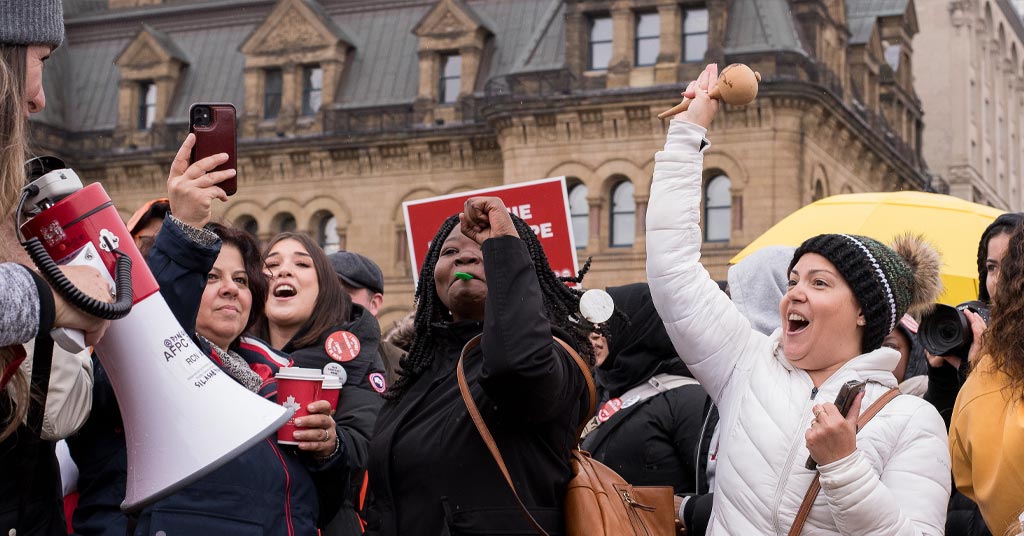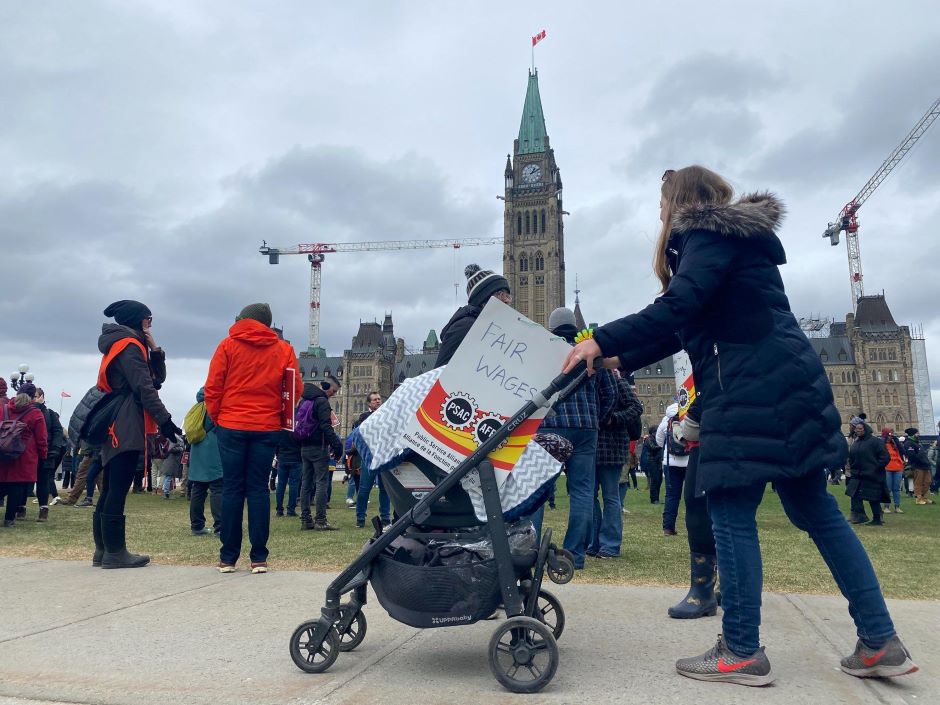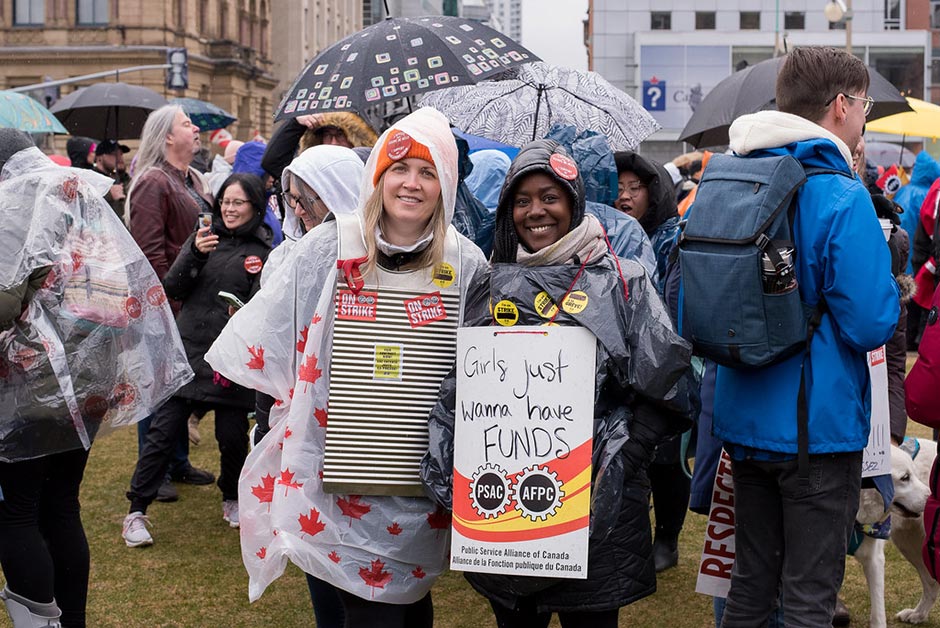
Federal Government is Failing Women, Black and Racialized Workers in the Public Service, Striking Workers Say
Striking workers call offers from Justin Trudeau’s ‘feminist’ government ‘frustrating’ and ‘hypocritical’
The federal government’s unacceptable wage offer to 155,000 striking public servants is “hypocritical” and “flies in the face” of the government’s own stated commitments to equity and diversity, striking workers say.
As of Friday morning, the government had not moved from its offer of a 9% wage increase over three years, despite the national general strike entering its second week. PSAC announced on Wednesday the union had agreed to lower its initial wage demand of 13.5%, but did not specify the new amount.
Kristina McLean, a member of PSAC’s bargaining team, says the government hasn’t been approaching equity and diversity in a “comprehensive” way during negotiations.
“The Treasury Board is looking at everything in a silo as opposed to taking a more holistic approach,” McLean told PressProgress. “That’s been the frustrating part. We’re not getting that look in a really comprehensive way.”
While there has been progress on non-monetary issues related to harassment and discrimination at the bargaining table, McLean said low-wages undermine efforts towards equity and diversity.
“Wages and inclusivity are not the diametric opposite to each other,” McLean said.
“I don’t know how you recruit women into a safe workplace while you’re not paying them enough to feed their families.”
Federal workers’ wages, adjusted for inflation, are no better today than they were in 2007, a recent CCPA study found.
Majority of federal public sector workers are women
The majority of workers in the federal public service are women. According to a 2021 Public Service Commission of Canada audit, 54.8% of the federal public service is made up of women and 21.8% are racialized, including Black and Indigenous workers.
One of the largest groups on strike, the Programs and Administrative Services group within the Treasury Board, is predominantly women. Of the PA group’s 90,000 members, PSAC says 72% are women and 61% make under $70,000.
McLean questions Justin Trudeau’s claims to be a “feminist” with his government’s current wage offer to federal workers.

Photo via Luke LeBrun/PressProgress.
“To me, that’s not feminist,” McLean said. ”It makes me question whether he cares about the workers and his constituents of this country.”
McLean adds that market wage adjustments are also needed to recruit more women into trades positions. McLean has worked within the Treasury Board’s Operational Services (SV) group for 17 years, starting out as the first woman and woman of colour working on tugboats for the Department of National Defense.
A study commissioned by PSAC found there was a “significant gap” in compensation between federal public and private sector trades positions. PSAC has asked for market adjustments for many of SV positions in bargaining.
“We say we want more women firefighters, we want more women on ships, we want more women electricians, we want more women to be in the trades, but we’re not giving them good wages,” McLean says.
“It’s time, this moment,’ McLean says. “If we procrastinate, my fear is that we will be procrastinating not just for another round, but we will be procrastinating for 20 years to come. When will the catch up happen?”
Black and racialized workers face more barriers in the public service
Nicholas Marcus Thompson, a member of PSAC and Executive Director for the Black Class Action Secretariat, says the government is being “hypocritical” with its wage offer.
“The Government of Canada’s position that it is a feminist government, a government that is diverse and inclusive, well, all of that flies in the face of what we’re seeing at the collective bargaining table,” Thompson told PressProgress.
“The majority of those impacted workers are women and a lot of racialized workers who already face systemic discrimination in their respective workplaces.”

PSAC (Flickr)
Thompson and other Black civil servants launched a class action lawsuit against the federal government in 2020 claiming damages for 30,000 Black workers who experienced anti-Black racism in the public service. Anti-Black racism has not only resulted in adverse workplace conditions, but also significant “financial losses” as Black workers were either denied employment or promotions based on their race, according to the Black Class Action website.
The Public Service Commission audit also found Black workers face the most barriers in recruitment within the public service.
Greg Fergus, Liberal MP for Hull-Aylmer and Secretariat to the Prime Minister and Treasury Board, previously stated Black public servants are “mostly grouped at the bottom levels.”
Former Treasury Board president Jane Pilpott also acknowledged Black public servants face barriers to “advancing their careers.”
“Securing a contract with wages that does not match inflation furthers the gap with these employees,” Thompson said. “That’s why the Alliance is standing up for these employees, because these are the lowest paid workers in the federal government of Canada.”
“These are the demands that the government is refusing to give way to,” Thompson said. “The government is very hypocritical.”
Our journalism is powered by readers like you.
We’re an award-winning non-profit news organization that covers topics like social and economic inequality, big business and labour, and right-wing extremism.
Help us build so we can bring to light stories that don’t get the attention they deserve from Canada’s big corporate media outlets.
Donate



